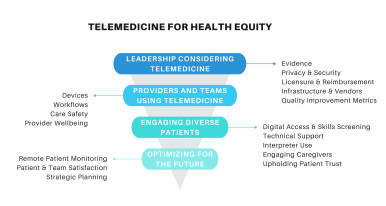Once the decision to integrate telemedicine into routine care delivery is made, frontline care teams must begin to deliver telemedicine efficiently, safely, and equitably.
Here is one of the key considerations for frontline teams.
In times of crisis such as the COVID-19 pandemic, burnout among those providing telemedicine is a serious concern. Telemedicine providers working remotely may lack the opportunity to check-in with colleagues, team members, or supervisors, resulting in feelings of isolation. In settings where a high proportion of patients have digital and health literacy challenges, the high prevalence of technical problems during telemedicine visits can exacerbate feelings of burnout. The loss of in-person care and dramatic increase in screen time has been called “Zoom fatigue” or “telemedicine fatigue,” and is uniquely physically and cognitively taxing. If you’re feeling this, you’re not alone.
- American Psychiatric Association Foundation Center for Workplace Mental Health: Working Remotely During COVID-19: Your Mental Health & Well-Being – This PDF includes suggestions to help health care providers maintain mental health and well-being while working remotely during COVID-19.
- Center for Care Innovations: Supporting and Empowering Team Members and Patients During COVID-19 — This webinar emphasizes that self-care among health care providers is essential, encouraging mindfulness such as meditation techniques to stave off compassion fatigue.
- Telebehavioral Health Institute: Zoom Fatigue—What You Can Do About It — This blog post includes some tips on recognizing and addressing “Zoom fatigue” arising from increased telemedicine use.





